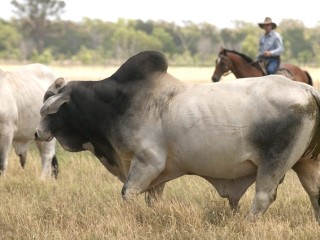 A six-month industry validation trial of a new poll gene genetic marker developed to identify the genetic traits of polledness and horns in Australian cattle breeds has shown an 89 percent success rate in Brahmans.
A six-month industry validation trial of a new poll gene genetic marker developed to identify the genetic traits of polledness and horns in Australian cattle breeds has shown an 89 percent success rate in Brahmans.
‘Success rate’ in this context means that in 89pc of Brahman bulls, a definitive answer can be provided on their polled/horned status.
In the remaining 11pc, the result will be ambiguous, meaning the animal could be either homozygous or heterozygous polled.
Beef CRC project leader Dr John Henshall of CSIRO Livestock Industries, says the test is working well with Brahman, Hereford and Droughtmaster breeds. A lot of potential is also being seen in Charolais, Santa Gertrudis, Shorthorn and Simmental breeds as well as Tropical Composites, where testing numbers are still being accumulated.
The test was developed by the Beef CRC, CSIRO, MLA and the Animal Genetics Breeding Unit at the University of New England in direct response to industry concerns about dehorning and animal welfare.
The test aims to identify genetically polled animals that will not pass horns on to the next generation of calves. It was first released in commercial trial form this time last year, during the opening stages of Brisbane‘s Royal Queensland Show, which starts today.
A CRC release issued yesterday afternoon said while dehorning has long been used to reduce carcase bruising and hide damage, and improve human workplace safety, it is also labour and time-intensive, and can adversely affect animal productivity and welfare.
“It’s impossible to tell if an animal is true polled or a carrier of horns without genetic testing or extensive progeny testing,” said Beef CRC commercialisation manager, Sarah Meibusch.
“The new test is based on a marker that is linked to the polled gene. It is not perfect on all animals, but the industry testing shows it does provide a reliable prediction for breeders in many instances,” she said.
The Beef CRC worked in collaboration with the University of Queensland and the cattle industry to test about 1800 samples representing most breeds in commercial cattle populations in Australia.
Dr Heather Burrow, chief executive of the Beef CRC said the polled gene trait was reasonably well understood in Bos Taurus breeds but the Australian beef industry also needed a test developed for Indicus cattle.
“We needed a test that was validated in across a wide range of breeds used in Australia, so producers can be confident in using it to make selection decisions for polledness,” she said.
Australian Brahman Breeders Association general manager John Croker said the test would add considerable value to Brahman seedstock animals tested as homozygous polls.
Leading genetics consultant Don Nicol recently speculated on Beef Central that all other things being equal, a homozygous polled Brahman displaying desirable EBVs and breeding characteristics could one day make a $5000 premium in the marketplace, over the same bull with horned or heterozygous genetics.
The polled gene marker test is currently available through University of Queensland’s Animal Genetics Laboratory for $33 (including GST) per animal. Pfizer Animal Genetics will soon offer the test also, as part of its Pfizer GeneStar DNA test package.
- See separate seedstock breeder perspectives on polled gene testing.
